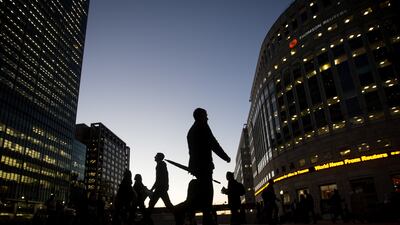British business confidence hit its highest level since April 2017 in August amid hopes the economy is recovering strongly to pre-pandemic levels despite concerns about staff shortages and supply chain challenges.
Lloyds Bank’s monthly business barometer rose by six points to 36 per cent, according to the UK lender, boosted by improvements in companies’ trading prospects and expectations of stronger growth ahead.
Optimism in the economy also rose at a similar pace following a dip in July when many firms were struggling with staff shortages caused by the spread of the Delta variant and a wave of workers being “pinged” by the National Health Service Covid-19 tracing app.
Meanwhile, a measure of pay growth was the strongest since 2018, according to the monthly poll of 1,200 firms conducted between August 2 and 16.
“Business confidence reaching its highest level in over four years tells a positive story about the country’s economic recovery,” said Hann-Ju Ho, senior economist at Lloyds Bank Commercial Banking.
“This confidence is driven by the continued success of the vaccine rollout, the removal of lockdown restrictions and adjustments to self-isolation rules.”
While the sentiment in the Lloyds survey is high, a flash reading of the IHS Markit/CIPS composite Purchasing Managers’ Index for August was not so positive.
Considered a good gauge of economic health, PMI dropped for the third month in a row to 55.3 from 59.2 in July, indicating a sharp slowdown this month as business activity was hampered by staff shortages and supply chain challenges.
Mr Ho said staff shortages remain a challenge, “but as the economy moves back towards pre-pandemic levels we can be optimistic that the momentum for business confidence can be sustained in the months ahead”.
Nine of the 12 UK regions and nations surveyed by Lloyds Bank reported increases in confidence with employers in the North West and East registered the biggest jump in confidence – up 26 points to 64 per cent and up 14 points to 39 per cent respectively.
Increases in confidence were also found in Scotland, the South East, the South West and Wales, with a smaller rise in London – up 4 points to 41 per cent.
Sector-wise, construction, manufacturing and services were upbeat reflecting rises in trading prospects for the year ahead.
However there was caution among companies about inflation and staff shortages.
More than a third of companies surveyed by Lloyds said they would offer staff pay rises of at least 2 per cent over the next 12 months and 17 per cent anticipated wage growth of 3 per cent or more, the highest since Lloyds began asking about salary increases in 2018.
The Bank of England is watching pay growth closely as it tries to work out how persistent a recent rise in inflation is likely to prove.
Lloyds said 44 per cent of companies it surveyed expected to increase the prices they charge, the highest level since December 2017.


